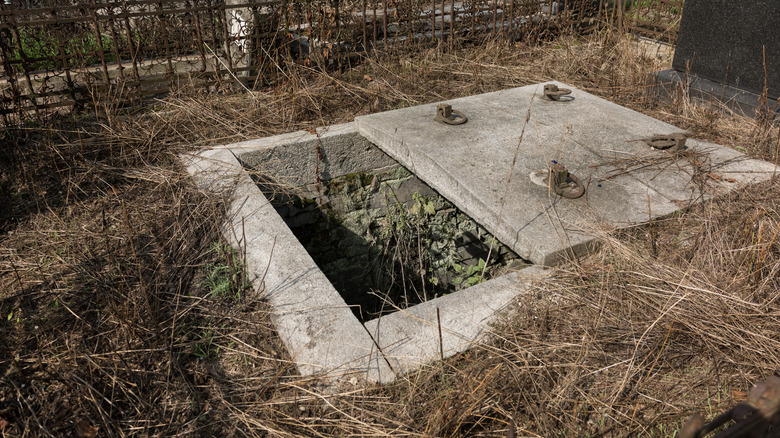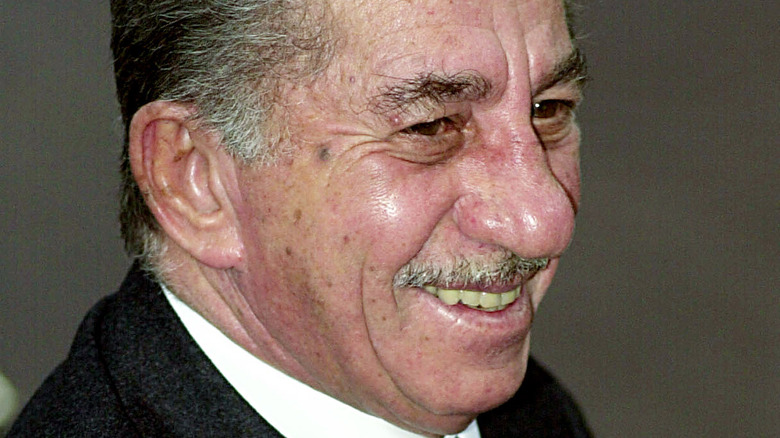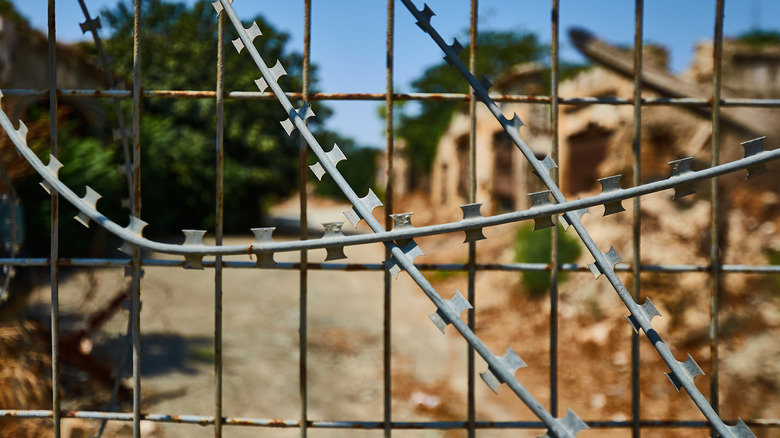The Former President Of Cyprus Had His Grave Robbed A Year After His Death
It was pouring rain in the early morning hours of December 11, 2009, on the Mediterranean island country of Cyprus. Deftera, a village near the capital of Nicosia, was still asleep. No one saw three men enter the village cemetery and pry a slab weighing over 550 pounds off its most famous grave — that of the former Cypriot President Tassos Papadopoulos. No one saw how exactly they extracted the coffin, how they forced the lid, or how the cadaver of the great man looked in the light of their torches one year after his death. But this, indeed, is how it happened, as the BBC and The Guardian reported at the time.
Per the BBC, the grave robbers used a white chemical substance — perhaps to cover their tracks — which left a stain on Papadopoulos' head marker. Ultimately, that wasn't what gave away the crime. Instead, it was the mess they left. The cemetery's caretaker arrived only hours after the event took place to find a massive pile of fresh earth next to the president's grave, along with an empty coffin.
Officials called the robbery 'unacceptable, unholy,' and 'unethical'
Sitting President Demetris Christofias, the successor (and past political rival) of Tasso Papadopoulos, was livid. Speaking from Brussels, where he was attending a European Council summit, Christofias called the theft "a sacrilege," as the BBC reported at the time. "This is an unacceptable, unholy, unethical and condemnable act that damages our tradition, our culture and our respect toward the dead."
Papadopoulos (seen above) had been a controversial figure in Cyprus. Educated in London at a time when his home country was still under British colonial rule, Papadopoulos returned to Cyrpus to join the independence movement as a member of the Cypriot resistance effort (via Britannica). He negotiated the terms of Cyprus' independence in 1960 and remained a force in the island's politics, rejecting a UN proposal for the island's unification and developing a reputation for anti-Turkish prejudice, one which he himself repudiated. (Northern Cyprus, which is ethnically Turkish, remains independent from the Greek-dominated European Republic.) He died on December 12, 2008, and in what many speculated was not a coincidence, his body was stolen on December 11, 2009, shortly before a planned memorial service, per The Guardian.
However, the stealing of Papadopoulos' corpse did not seem politically motivated. As Reuters reported in 2010, a ransom was purportedly the impetus behind the crime. However, the Papadopoulos family, along with the Cypriot government, both made contradictory claims. Reuters noted that family members said they'd had no contact with anyone, while the government stated the motive was financial, but no money had changed hands.
The grave robbery was tied to a man named Al Capone -- but not the one you think
As the BBC reported in 2011, the stolen body of Tassos Papadopoulos turned up three months later after it was stolen. Per the news outlet, a man described as an Indian national named Sarbjit Singh confessed to the police that two Cypriot brothers had hired him to help move the huge stone slab off of Papadopoulos' grave. According to Singh's account, the trio then proceeded to throw the body in the back of a pickup truck and subsequently reburied it in a cemetery nearby. Singh eventually confessed to authorities due to feelings of guilt possibly prompted by dire financial straits, as he asked the former president's family for money at that time, according to the BBC.
So who was behind it? According to Singh, it was Antonis Prokopiou Kitas, who the Abu Dhabi-based newspaper The National reported as known locally by the nickname "Al Capone." A hardened criminal, Kitas had been sent to prison twice, once for robbing a jeweler's and again, on consecutive life sentences, for sexually assaulting and murdering two women, per the outlet. In December of 2008, Kitas slipped out of a prison hospital, tiptoeing past his sleeping guards and out a window. He was found three weeks later, but in the meantime, he and his brother, Mamas Kitas, along with Singh, had violated Papadopoulos' tomb. Per the BBC, the Kitas brothers each received 20 months for the crime, including criminal charges of sacrilege; Singh, for his part, received 18 months.


